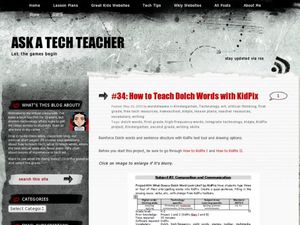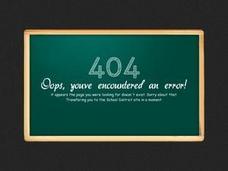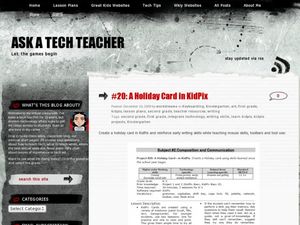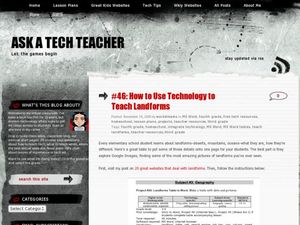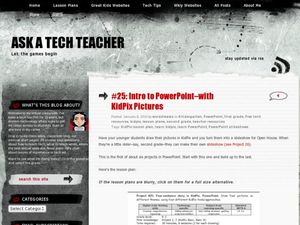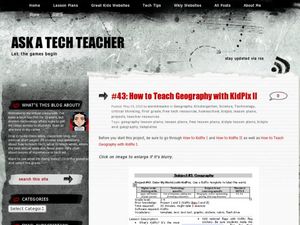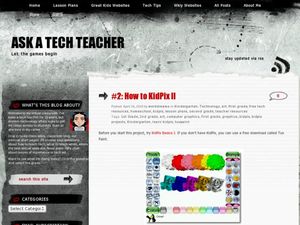Curated OER
What is a Computer Crime?
An important lesson plan on cybercrimes is here for you. In it, young computer users learn about how people commit crimes on computers by hacking into accounts, and stealing personal information from people. Some excellent discussion...
Code.org
Practice Performance Task - Security and Hacking in the Real World
Young computer scientists create a visual artifact that represents their research into a computing innovation in the world of cybersecurity. They then work individually to write an essay on the impact of technology on cybersecurity.
Curated OER
Have I Been Hacked?
Students investigate how effective SNEAK strategies are in detecting hackers. In this technology lesson plan, students explain the ethical issues about hacking. They graph and analyze their experimental results.
Curated OER
Know Your Computer Hardware #103
Young scholars discover the different terms and parts of a computer's body. In this computer basics lesson, students become familiar with the parts of the computer, starting in kindergarten and increasing their knowledge through...
Curated OER
Computers
In this computers worksheet, learners fill in the blanks to sentences that talk about computers. Students complete 15 sentences.
Curated OER
Curious? "Hack Away" Computer Activity
In this computer worksheet, students complete 3 multiple choice questions about computer hacking. Page contains multiple links to additional activities.
Curated OER
Cartoons for the Classroom: The Climate Change Debate
Is global warming all smoke and mirrors? Find out what your scholars think with this handout, which has them analyzing two political cartoons on the topic. Background information gives context, detailing the computer hacking during the...
Curated OER
How to Teach Dolch Words with Kid Pix
Students use KidPix computer program to learn Dolch sight words. In this technology and language lesson, students type their Dolch sight words into KidPix to create a quasi-sentence.
Curated OER
Cyber-crime
Students discuss what types of Internet activity are or should be considered criminal, examine how criminal prohibitions against certain types of Internet activity are best implemented in law, determine whether computer crimes are unique...
Curated OER
Reading Comprehension 2: Level 11
Engage your class by asking them how many passwords they think they currently have. This article brings to light the crazy amount of passwords the average computer user has! After reading the article, kids complete the multiple-choice...
Curated OER
Window Skills: Make Your Own Wallpaper
Students create wallpaper for their computer screen. In this technology activity, students use KidPix or Paint to design a picture which will be used as the wallpaper on their computer.
Curated OER
Breaking News English: Forty Million Credit Cards Hacked
In this English worksheet, students read "Forty Million Credit Cards Hacked," and then respond to 47 fill in the blank, 7 short answer, 20 matching, and 8 true or false questions about the selection.
Curated OER
On Being Modern Knight
Students, upon completion of the "Knighting Ceremony" and reflection, research the meaning of privacy, plagiarism, pirating, computer viruses, or hacking. Then they design a survey of high school students to find the level of acceptance...
Curated OER
A Holiday Card in KidPix
Students create a holiday card using computer software. In this computer card making lesson, students design an original holiday card using a variety of tools. Students navigate the software utilizing various tools.
Curated OER
How to Use Technology to Teach Landforms
Students create a landform table on the computer. In this geography lesson plan, students use Microsoft Word to design a 3 column table. They list different landforms, examples, and attach a picture of each.
Curated OER
Excel for Beginners
In this Excel lesson plan, students set a formula to check their homework. Students also use clipart, work in groups, and learn to use the tools in the drop-down list.
Curated OER
Tinker Toys
Students explore various computer items. They describe possible alternative uses for computer technology. Students explore the practice of "reverse engineering." They write an opinion essay on the ethics behind "reverse engineering."
Curated OER
Intro to PowerPoint-with KidPix Pictures
Students construct a four sentence creative story by using KidPix software. In this computer technology lesson, students use KidPix software to develop slides about themselves, their family, and their house. Students illustrate each...
Curated OER
How to Teach Geography with KidPix II
Students use the computer program KidPix II to color a map of the world. In this world map lesson plan, students fill in different colors for different continents that are told to them on the program KidPix II.
Curated OER
Tessellations in Excel
Pupils complete an Excel project on tessellations. In this technology and math instructional activity, students discuss tessellations and their occurrences in nature. Pupils use the Excel computer program to create tessellations.
Curated OER
Visit My Class Wikis
Students visit the links on the blog site to learn about class wikis. In this technology integration instructional activity, students visit the links to view class wikis.
Curated OER
Pronoun Reference - Exercise 3
Do members of your class need extra work on pronoun reference? The 20 sentences included on this worksheet ask pupils to fix the underlined pronoun reference errors. The address for an interactive version of the exercise is included.
Curated OER
How To KidPix II
Young scholars practice using KidPix to create illustrations. In this visual arts lesson, students define key vocabulary words, such as "palette" and "toolbar" to familiarize themselves with the KidPix program. Young scholars...
Curated OER
A Holiday Calendar in MS Publisher for Elementary School
Students create a holiday calendar using ms word. In this technology lesson, students create their own calendar while learning basic Publisher skills. Students use clipart, explore how to change fonts, and how to use templates.









